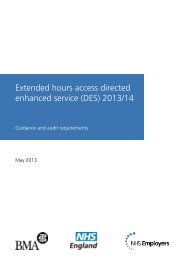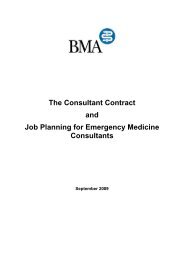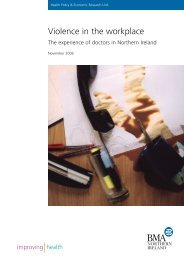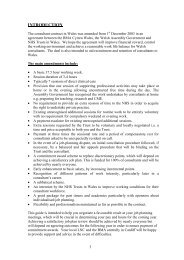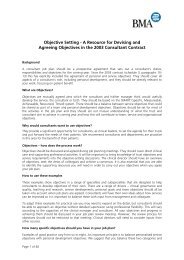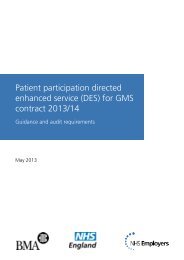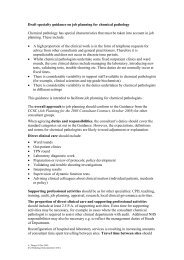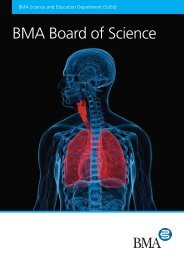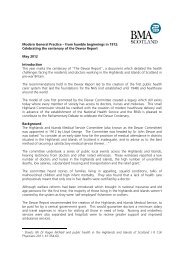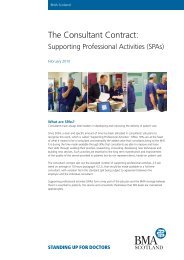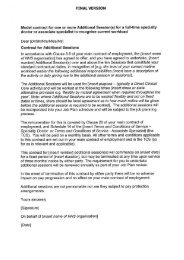43657 Consent Tool Kit - BMA
43657 Consent Tool Kit - BMA
43657 Consent Tool Kit - BMA
Create successful ePaper yourself
Turn your PDF publications into a flip-book with our unique Google optimized e-Paper software.
Mental Capacity Act<br />
tool kit
Mental Capacity Act tool kit •<br />
About this tool kit<br />
ABOUT THIS TOOL KIT<br />
In 2007 the Mental Capacity Act 2005 came into<br />
force in England and Wales. It provides a legal<br />
framework for decision-making on behalf of<br />
people aged 16 or over who cannot make<br />
decisions themselves. It also sets out the law for<br />
people who wish to make preparations for a time<br />
in the future when they may lack capacity to<br />
make decisions.<br />
The purpose of this tool kit is to act as a prompt<br />
to doctors when they are providing care and<br />
treatment for people who lack, or who may lack,<br />
the mental capacity to make decisions on their<br />
own behalf. In the <strong>BMA</strong>’s view, this is likely to be<br />
the majority of doctors. The tool kit consists of a<br />
series of cards relating to specific areas of the Act,<br />
such as how to assess capacity, the Act’s basic<br />
principles, advance refusals of treatment, research<br />
and Lasting Powers of Attorney (LPAs). Although<br />
each of the cards refers to separate areas of the<br />
Act, there is inevitably a degree of overlap.<br />
This tool kit is not intended to provide definitive<br />
guidance on all the issues surrounding the Mental<br />
Capacity Act. Card 1 lists alternative sources of<br />
guidance that should be used in conjunction with<br />
the cards. In cases of doubt, legal advice should be<br />
sought. The tool kit is designed to raise doctors’<br />
awareness of the Act, and to provide an aid for<br />
good decision-making.<br />
British Medical Association 1
Mental Capacity Act tool kit •<br />
About this tool kit<br />
This tool kit applies to England and Wales. In<br />
Scotland, decision-making in this area is covered<br />
by the Adults With Incapacity (Scotland) Act 2000.<br />
In Northern Ireland, decision-making is governed<br />
by the common law.<br />
The tool kit is available on the <strong>BMA</strong>’s website. NHS<br />
Trusts, medical schools and individual doctors may<br />
download and adapt it to suit their own<br />
requirements. There are no copyright restrictions<br />
on this tool kit – please feel free to make multiple<br />
copies.<br />
The <strong>BMA</strong> would welcome feedback on the<br />
usefulness of the tool kit. If you have any<br />
comments please address them to:<br />
Medical Ethics Department<br />
British Medical Association<br />
<strong>BMA</strong> House<br />
Tavistock Square<br />
London, WC1H 9JP<br />
Tel: 020 7383 6286<br />
Fax: 020 7383 6233<br />
Email: ethics@bma.org.uk<br />
Website: www.bma.org.uk<br />
2 British Medical Association
CARD 1<br />
Mental Capacity Act tool kit •<br />
Guidance on the Mental Capacity Act<br />
GUIDANCE ON THE MENTAL<br />
CAPACITY ACT<br />
Publications<br />
Advance decisions and proxy decision-making in<br />
medical treatment and research, British Medical<br />
Association (2007)<br />
Assessment of mental capacity, British Medical<br />
Association and The Law Society (3rd edition due<br />
in 2008-9)<br />
Medical ethics today: the <strong>BMA</strong>’s handbook of<br />
ethics and law, British Medical Association (2004)<br />
Medical treatment for adults with incapacity:<br />
guidance on medico-legal issues in Scotland,<br />
British Medical Association (2002)<br />
Mental Capacity Act 2005 Code of Practice,<br />
Department for Constitutional Affairs (2007)<br />
The impact of the Human Rights Act 1998 on<br />
medical decision-making, British Medical<br />
Association (2007)<br />
The Mental Capacity Act – guidance for health<br />
professionals, British Medical Association (2007)<br />
Making decisions – a guide for people who work<br />
in health and social care, Ministry of Justice and<br />
Office of the Public Guardian (2007)<br />
British Medical Association 3
Mental Capacity Act tool kit •<br />
General information<br />
CARD 2<br />
GENERAL INFORMATION<br />
1 The Mental Capacity Act 2005<br />
The Mental Capacity Act 2005 provides a<br />
comprehensive framework for decisionmaking<br />
on behalf of adults aged 16 and over<br />
who lack capacity to make decisions on their<br />
own behalf. The Act applies to England and<br />
Wales. Scotland has its own legislation, the<br />
Adults With Incapacity (Scotland) Act 2000.<br />
The approach in Northern Ireland is currently<br />
governed by the common law.<br />
The Act applies to all decisions taken on<br />
behalf of people who permanently or<br />
temporarily lack capacity to make such<br />
decisions themselves, including decisions<br />
relating to medical treatment. All doctors<br />
working with adults who lack, or who may<br />
lack, capacity will need to be familiar with<br />
both its underlying principles and its basic<br />
provisions. This tool kit sets out the main<br />
features of the Act in so far as it relates to<br />
decisions about medical treatment.<br />
The Act is accompanied by a statutory Code of<br />
Practice providing guidance on how it should<br />
be used. Certain people have a legal duty to<br />
have regard to the guidance in the Code of<br />
Practice, including anyone acting in a<br />
professional capacity or being paid for their<br />
work with people who may lack capacity. It is<br />
therefore essential that health professionals<br />
are familiar with the Code of Practice.<br />
4 British Medical Association
Mental Capacity Act tool kit •<br />
General information<br />
2 What is capacity?<br />
Decision-making capacity refers to the<br />
everyday ability that individuals possess to<br />
make decisions or to take actions that<br />
influence their life, from simple decisions<br />
about what to have for breakfast, to farreaching<br />
decisions about serious medical<br />
treatment. In a legal context it refers to a<br />
person’s ability to do something, including<br />
making a decision, which may have legal<br />
consequences for the person themselves or for<br />
other people.<br />
3 When does a person lack capacity?<br />
For the purpose of the Act a person lacks<br />
capacity if, at the time the decision needs<br />
to be made, he or she is unable to make or<br />
communicate the decision because of an<br />
‘impairment of, or a disturbance in the<br />
functioning of, the mind or brain’. The Act<br />
contains a two-stage test of capacity:<br />
• is there an impairment of, or disturbance<br />
in the functioning of, the person’s mind<br />
or brain? If so;<br />
• is the impairment or disturbance sufficient<br />
that the person is unable to make that<br />
particular decision?<br />
The assessment of capacity is ‘task-specific’. It<br />
focuses on the specific decision that needs to<br />
be made at the specific time the decision is<br />
required. It does not matter if the incapacity is<br />
temporary, or the person retains the capacity<br />
to make other decisions, or if the person’s<br />
capacity fluctuates. The inability to make a<br />
decision, however, must be a result of the<br />
impairment or disturbance already mentioned.<br />
British Medical Association 5
Mental Capacity Act tool kit •<br />
General information<br />
This could be the result of a variety of factors,<br />
including mental illness, learning disability,<br />
dementia, brain damage, or intoxication.<br />
The important point is that the impairment<br />
or disturbance renders the individual unable<br />
to make the decision in question.<br />
If the impairment is temporary and the<br />
decision can realistically be put off until such<br />
a time as he or she is likely to regain capacity,<br />
then it should be deferred. While it is clear<br />
that an unconscious patient will lack capacity,<br />
most other categories of patient will retain<br />
some decision-making capacity, however<br />
slight.<br />
6 British Medical Association
CARD 3<br />
BASIC PRINCIPLES<br />
Mental Capacity Act tool kit •<br />
Basic principles<br />
1 What are the Act’s basic principles?<br />
The Act sets out a number of basic principles<br />
that must govern all decisions made and<br />
actions taken under its powers. These are<br />
rooted in best practice and the common law<br />
and are designed to be fully compliant with<br />
the relevant sections of the Human Rights Act.<br />
Where confusion arises about how aspects of<br />
the Act should be implemented, it can be<br />
extremely helpful to refer back to them.<br />
Actions or decisions that clearly conflict with<br />
them are unlikely to be lawful, although there<br />
may be occasions on which they are in tension<br />
with each other, and some balancing will be<br />
required. A list of the principles, with brief<br />
descriptions, is given below. Further<br />
information about best interests comes later<br />
in the tool kit.<br />
2 A presumption of capacity<br />
It is a fundamental principle of English law<br />
that adults have the right to make decisions<br />
on their own behalf and are assumed to have<br />
the capacity to do so, unless it is proven<br />
otherwise. The responsibility for proving that<br />
an adult lacks capacity falls upon the person<br />
who challenges it.<br />
British Medical Association 7
Mental Capacity Act tool kit •<br />
Basic principles<br />
3 Maximising decision-making capacity<br />
Closely linked to the presumption of capacity,<br />
this states that everything practicable must be<br />
done to support individuals to make their own<br />
decisions, before it is decided that they lack<br />
capacity. For example, advocates and<br />
communication support might be necessary,<br />
and consideration should be given to whether<br />
an individual’s capacity is affected by the time<br />
of day or medication regimes. The aim is to<br />
ensure that individuals who are capable of<br />
making decisions for themselves, but may<br />
need some support, are not inappropriately<br />
assessed as incapacitated.<br />
4 The freedom to make unwise decisions<br />
The fact that an individual makes a rash,<br />
unwise or irrational decision, or begins to act<br />
out of character, is not itself proof of<br />
incapacity. All adults retain the right to make<br />
decisions which to others might seem unwise<br />
or irrational. Although such actions may raise<br />
questions about capacity – where for example<br />
they follow a period of illness or an accident –<br />
they are in no way determinative. What<br />
matters is the ability to make the decision, not<br />
the outcome.<br />
5 Best interests<br />
At the heart of the Act lies the principle that<br />
where it is determined that individuals lack<br />
capacity, any decision or action taken on their<br />
behalf must be in their best interests.<br />
Practically speaking, what constitutes an<br />
individual’s best interests will depend upon<br />
the circumstances of each individual case.<br />
8 British Medical Association
Mental Capacity Act tool kit •<br />
Basic principles<br />
6 The less restrictive alternative<br />
Whenever a person is making a decision on<br />
behalf of an adult who lacks capacity, he or<br />
she must consider if it is possible to make the<br />
decision in a way that is less restrictive of that<br />
individual’s fundamental rights or freedoms.<br />
There are often several ways to achieve a<br />
desired outcome, and where possible the<br />
choice must be the one that interferes least<br />
with the individual’s freedoms while still<br />
achieving the necessary goal. The option<br />
chosen must, however, be in the person’s best<br />
interests, which may not in fact be the least<br />
restrictive.<br />
British Medical Association 9
Mental Capacity Act tool kit •<br />
Assessing capacity<br />
CARD 4<br />
ASSESSING CAPACITY<br />
1 Who should assess capacity?<br />
The individual who wishes to make a decision<br />
on behalf of an incapacitated person is<br />
responsible for assessing his or her capacity.<br />
Where consent to medical treatment is<br />
required, the health professional proposing<br />
the treatment needs to decide whether the<br />
patient has the capacity to consent. The<br />
reasons why capacity is in doubt should be<br />
recorded in the medical record, as should<br />
details of the assessment process and its<br />
findings. The more serious the decision, the<br />
more formal the assessment of capacity is<br />
likely to be, and, where appropriate, it might<br />
be advisable to refer to a psychiatrist or<br />
psychologist for a second opinion.<br />
2 How do you assess capacity?<br />
The Act makes use of a ‘functional’ test of<br />
capacity, adapted from the common law,<br />
which focuses on the decision-making process<br />
itself. First it must be established that the<br />
person being assessed has ‘an impairment of,<br />
or a disturbance in the functioning of, the<br />
mind or brain’ which may affect their ability<br />
to make the decision in question. Under the<br />
Act, a person is regarded as being unable to<br />
make a decision if, at the time the decision<br />
needs to be made, he or she is unable:<br />
• to understand the information relevant to<br />
the decision<br />
10 British Medical Association
Mental Capacity Act tool kit •<br />
Assessing capacity<br />
• to retain the information relevant to the<br />
decision<br />
• to use or weigh the information; or<br />
• to communicate the decision (by any means).<br />
Where an individual fails one or more parts of<br />
this test, then they do not have the relevant<br />
capacity and the entire test is failed.<br />
In assessing capacity, consideration should be<br />
given, where appropriate, to the views of<br />
those close to the individual. Family members<br />
and close friends may be able to provide<br />
valuable background information, although<br />
their views about what they might want for<br />
the individual must not be allowed to<br />
influence the assessment. An assessment that<br />
a person lacks the capacity to make a decision<br />
must not be discriminatory. It must not be<br />
based simply on a person’s:<br />
• age<br />
• appearance<br />
• assumptions about their condition<br />
• any aspect of their behaviour.<br />
3 Uncertainties about capacity<br />
Difficult judgements will still need to be<br />
made, particularly where there is fluctuating<br />
capacity or where some capacity is<br />
demonstrable but its extent is uncertain. This<br />
four-stage test is nevertheless well-established,<br />
and more detailed advice on practical<br />
procedures for assessing capacity is available<br />
from other sources. The Act requires that any<br />
decision that a person lacks capacity must be<br />
based on a ‘reasonable belief’ backed by<br />
objective reasons.<br />
British Medical Association 11
Mental Capacity Act tool kit •<br />
Assessing capacity<br />
Where there are disputes about whether a<br />
person lacks capacity that cannot be resolved<br />
using more informal methods, the Court of<br />
Protection can be asked for a judgement.<br />
4 What do you do when an individual<br />
refuses to be assessed?<br />
Occasionally an individual whose capacity is in<br />
doubt may refuse to be assessed. In most<br />
cases, a sensitive explanation of the potential<br />
consequences of such a refusal, such as the<br />
possibility that any decision they may make<br />
will be challenged at a later date, will be<br />
sufficient for them to agree. However, if the<br />
individual flatly refuses, in most cases no one<br />
can be required to undergo an assessment.<br />
12 British Medical Association
CARD 5<br />
BEST INTERESTS<br />
Mental Capacity Act tool kit •<br />
Best interests<br />
1 What does the Act mean by best<br />
interests?<br />
All decisions taken on behalf of someone who<br />
lacks capacity must be taken in his or her best<br />
interests. This is a statutory restatement of the<br />
previous common law position. The Act<br />
provides a checklist of common factors that<br />
must be taken into account when making a<br />
best interests judgement. A best interests<br />
judgement is not an attempt to determine<br />
what the person would have wanted,<br />
although this must be taken into account. It is<br />
as objective a test as possible of what would<br />
be in the person’s actual best interests, taking<br />
into consideration all relevant factors.<br />
2 What should you take into account when<br />
assessing best interests?<br />
Lacking capacity to make a decision should<br />
not exclude an individual from participating<br />
in the decision-making process as far as is<br />
possible. The decision-maker must also take<br />
into account the likelihood that the person<br />
will regain capacity. A decision should be<br />
delayed if it can reasonably be left until he<br />
or she regains the capacity to make it. Other<br />
relevant factors are likely to include:<br />
• the person’s past and present wishes and<br />
feelings, including any relevant written<br />
statement made when she or he had<br />
capacity – this would include general<br />
statements of wishes<br />
British Medical Association 13
Mental Capacity Act tool kit •<br />
Best interests<br />
• his or her beliefs or values where they<br />
would have an impact on the decision<br />
• other factors the person would have<br />
considered if able to do so – such as the<br />
effect of the decision on other people.<br />
A crucial part of any best interests judgement<br />
will involve a discussion with those close to<br />
the individual, including family, friends or<br />
carers, where it is practical or appropriate to<br />
do so, bearing in mind the duty of<br />
confidentiality. (For more information on<br />
information sharing, see card 16.) It should<br />
also include anyone previously nominated by<br />
the person as someone to be consulted,<br />
anyone appointed to act under a Lasting<br />
Power of Attorney or any deputy appointed<br />
to make decisions by the Court of Protection.<br />
Further information about the last two is<br />
given later in the tool kit (see cards 11 and 12).<br />
3 Are there any exceptions to the best<br />
interests principle?<br />
There are two circumstances when the best<br />
interests principle will not apply. The first is<br />
where someone has previously made an<br />
advance decision to refuse medical treatment<br />
while they had capacity. Where the advance<br />
decision is valid and applicable, it should be<br />
respected, even if others think that the<br />
decision is not in his or her best interests.<br />
(For more information on advance decisions,<br />
see card 9.)<br />
The second exception relates to the enrolment<br />
of incapacitated adults in certain forms of<br />
research. This is covered in more detail in<br />
card 10.<br />
14 British Medical Association
Mental Capacity Act tool kit •<br />
Acts in connection with care or treatment<br />
CARD 6<br />
ACTS IN CONNECTION WITH<br />
CARE OR TREATMENT<br />
1 What powers does the Act give to health<br />
professionals?<br />
An action or intervention will be lawful – ie<br />
health professionals will enjoy protection from<br />
liability – where the decision-maker has a<br />
reasonable belief that the individual lacks<br />
capacity to consent to what is proposed, and<br />
that the action or decision is in his or her best<br />
interests. (See card 5 on how to assess<br />
someone’s best interests.) It applies to anyone<br />
making a decision on behalf of another,<br />
irrespective of whether they have a<br />
professional relationship with the<br />
incapacitated individual. It could include, for<br />
example, taking an incapacitated stranger by<br />
the arm to assist them to cross a road. In<br />
relation to medical treatment, it is applicable<br />
not only to an episode of treatment itself, but<br />
also to those necessary ancillary procedures<br />
such as conveying a person to hospital.<br />
2 How far do these powers extend?<br />
There are limits to these powers. A valid<br />
advance decision, and a valid decision by an<br />
attorney or a court-appointed deputy would<br />
take precedence. The Act also sets limits to the<br />
extent to which the freedom of movement of<br />
an incapacitated person can be restricted. An<br />
incapacitated person can only be restrained<br />
where there is a reasonable belief that it is<br />
necessary to prevent harm to the<br />
British Medical Association 15
Mental Capacity Act tool kit •<br />
Acts in connection with care or treatment<br />
incapacitated person. Any restraint must be<br />
proportionate to the risk, and of the minimum<br />
level necessary to protect the incapacitated<br />
person. (For more information about restraint,<br />
see card 7.)<br />
The onus is on the person wishing to act to<br />
justify as objectively as possible his or her<br />
belief that the person being cared for is likely<br />
to be harmed unless some sort of physical<br />
intervention or other restraining action is<br />
taken. Although reasonable use of restraint<br />
may be lawful, the Act makes it clear that it<br />
will never be lawful to deprive a person of his<br />
or her liberty within the meaning of Article<br />
5(1) of the European Convention on Human<br />
Rights. (See cards 7 and 8 for more<br />
information on deprivation of liberty.)<br />
3 When is court approval required?<br />
Before the Act came into force, the courts had<br />
decided that some decisions were so serious<br />
that each case should be taken to court so<br />
that a declaration of lawfulness could be<br />
made. The Act’s Code of Practice advises that<br />
the following cases should continue to go<br />
before the court:<br />
• proposals to withdraw or withhold artificial<br />
nutrition and hydration from patients in a<br />
persistent vegetative state<br />
• cases involving organ or bone marrow<br />
donation by a person lacking the capacity<br />
to consent<br />
• proposals for non-therapeutic sterilisation<br />
• some termination of pregnancy cases<br />
16 British Medical Association
Mental Capacity Act tool kit •<br />
Acts in connection with care or treatment<br />
• cases where there is a doubt or dispute that<br />
cannot be resolved locally about whether a<br />
particular treatment will be in a person’s<br />
best interests<br />
• cases involving ethical dilemmas in<br />
untested areas.<br />
British Medical Association 17
Mental Capacity Act tool kit •<br />
Restraint<br />
CARD 7<br />
RESTRAINT<br />
1 What is restraint?<br />
There may be occasions when health<br />
professionals need to consider the use of<br />
restraint in treating an individual lacking<br />
capacity. The Act states that restraint is the<br />
use or threat of force, to make someone do<br />
something they are resisting, or restricting a<br />
person’s freedom of movement, whether they<br />
are resisting or not. The Act only refers to<br />
restraint to prevent harm to the patient.<br />
Health professionals have a common law right<br />
to use restraint to prevent harm to others.<br />
2 Types of restraint<br />
Restraint can be overt, such as the use of<br />
bedrails. It can also be covert and indirect such<br />
as doors that are heavy and difficult to open<br />
or putting patients in low chairs from which<br />
they find it difficult to move. Restraint<br />
may be:<br />
• physical – held by one or more persons<br />
• mechanical – the use of equipment such as<br />
bedrails, mittens to stop patients removing<br />
nasogastric tubes or catheters<br />
• chemical – involving medication, for<br />
example sedation<br />
• psychological – telling patients that they<br />
are not allowed to do something, or taking<br />
away aids necessary for them to do what<br />
they want, for example spectacles or<br />
walking aids.<br />
18 British Medical Association
Mental Capacity Act tool kit •<br />
Restraint<br />
3 When is restraint lawful?<br />
Restrictive measures should be a last resort<br />
and alternatives to restraint must always be<br />
considered. Anybody proposing to use<br />
restraint must have objective reasons to justify<br />
that it is necessary. They must also be able to<br />
show that the patient is likely to suffer harm<br />
unless proportionate restraint is used. A<br />
proportionate response means using the least<br />
intrusive type and the minimum amount of<br />
restraint to achieve the objective, in the best<br />
interests of the patient lacking capacity. If<br />
these conditions are met, it is permissible to<br />
restrain a patient to provide necessary<br />
treatment. It also follows that in such<br />
circumstances there would be no liability for<br />
assault. The restraint must not amount to a<br />
deprivation of liberty and if it is considered<br />
necessary to go so far as to deprive someone<br />
of their liberty in order to safeguard their<br />
interests, special safeguards must be<br />
employed. (For further information on<br />
deprivation of liberty, see card 8.)<br />
British Medical Association 19
Mental Capacity Act tool kit •<br />
Deprivation of liberty<br />
CARD 8<br />
CARE AND TREATMENT AMOUNTING<br />
TO DEPRIVATION OF LIBERTY – THE<br />
‘BOURNEWOOD’ SAFEGUARDS<br />
1 Deprivation of liberty<br />
The basic principles of the Mental Capacity Act<br />
make it clear that people who lack the ability<br />
to consent to treatment should be cared for in<br />
the least restrictive manner possible. There will<br />
be circumstances however in which appropriate<br />
care or treatment that is in an individual’s best<br />
interests can only be provided in circumstances<br />
that will amount to a ‘deprivation of liberty’.<br />
Following an amendment, the Mental Capacity<br />
Act now provides a set of safeguards that must<br />
be in place where an individual is deprived of<br />
liberty. These new safeguards come into effect<br />
in April 2009.<br />
The concept of ‘deprivation of liberty’ is not<br />
straightforward and where doctors identify<br />
individuals who may be being deprived of<br />
liberty and who are not subject to mental<br />
health legislation, appropriate advice should<br />
be sought.<br />
This card gives a brief outline of relevant<br />
factors to take into account when assessing<br />
whether an individual is or might be deprived<br />
of liberty. It looks at means of avoiding<br />
depriving people of liberty and at safeguards<br />
that must be in place when it cannot be<br />
avoided.<br />
20 British Medical Association
Mental Capacity Act tool kit •<br />
Deprivation of liberty<br />
2 What is deprivation of liberty?<br />
The courts have identified that the following<br />
factors are likely to result in deprivation of<br />
liberty:<br />
• restraint is used, including sedation, to<br />
admit a person who is resisting<br />
• professionals exercise complete and<br />
effective control over care and movement<br />
for a significant period<br />
• professionals exercise control over<br />
assessments, treatment, contacts and<br />
residence<br />
• the person would be prevented from<br />
leaving if they made a meaningful attempt<br />
to do so<br />
• a request by carers for the person to be<br />
discharged to their care is likely to be<br />
refused<br />
• the person is unable to maintain social<br />
contacts because of the restrictions placed<br />
on access to other people<br />
• the person loses autonomy because they are<br />
under continuous supervision and control.<br />
3 How can deprivation of liberty be avoided?<br />
All individuals should be treated in ways that<br />
restrict fundamental freedoms as little as<br />
possible. Where a decision is made on behalf<br />
of an individual who lacks capacity, the<br />
decision must be the least restrictive of the<br />
available options, as long as that is in the<br />
person’s best interests. Wherever possible,<br />
deprivation of liberty should be avoided.<br />
Active measures should be taken to avoid<br />
unnecessary restrictions, and decision-making<br />
should involve, as fully as possible, both the<br />
individuals and those who are close to them.<br />
British Medical Association 21
Mental Capacity Act tool kit •<br />
Deprivation of liberty<br />
Good practice in this area will include the<br />
following:<br />
• decisions should be taken and reviewed in<br />
a structured way and the reasons behind<br />
them recorded<br />
• effective documented care planning, (which<br />
could include, where appropriate, the Care<br />
Programme approach, Single Assessment<br />
Process, Person Centred Planning or Unified<br />
Assessment), should be in place. This should<br />
include appropriate and documented<br />
involvement of the individual, their family,<br />
friends, carers or other people interested in<br />
their welfare<br />
• proper documented assessment of whether<br />
the patient lacks the capacity to decide<br />
whether to consent to the care being<br />
proposed<br />
• alternatives to admission to hospital or<br />
residential care should be carefully<br />
considered and any restrictions placed on<br />
liberty in care homes or hospitals should be<br />
kept to the minimum necessary<br />
• appropriate information, presented in ways<br />
that are sensitive to individual needs, should<br />
be offered to patients and those involved in<br />
their care<br />
• where appropriate, local advocacy services<br />
should be enrolled to provide support to<br />
patients and their families, friends and<br />
carers<br />
• care should be taken to ensure as far as<br />
possible that the patient remains in contact<br />
with those close to him or her<br />
• the assessment of the patient’s capacity, and<br />
his or her care plan, should be kept under<br />
review.<br />
22 British Medical Association
Mental Capacity Act tool kit •<br />
Deprivation of liberty<br />
4 How do you authorise deprivation of<br />
liberty?<br />
Until the safeguards introduced in 2009,<br />
deprivation of liberty may be authorised<br />
either by using detention under the Mental<br />
Health Act (MHA), or if the grounds for MHA<br />
detention are not met, by applying to the<br />
Court of Protection.<br />
After April 2009, when an individual lacking<br />
capacity is identified as being at risk of<br />
deprivation of liberty in a hospital or care<br />
home setting, the ‘managing authority’ of the<br />
hospital or care home has to make an<br />
application to a ‘supervisory’ body to request<br />
an authorisation of the deprivation. In the<br />
case of an NHS hospital, the managing<br />
authority will be the NHS body responsible for<br />
its running. In the case of a private hospital or<br />
care home, the managing authority will be<br />
the person registered, or required to be<br />
registered, under Part 2 of the Care Standards<br />
Act 2000. In England the supervisory body is<br />
the Primary Care Trust, if the patient is in<br />
hospital, or the local authority, if the patient is<br />
in a care home. In Wales it is either the<br />
National Assembly for Wales or a Local Health<br />
Board, or the relevant local authority for a<br />
patient in a care home. The application should<br />
be made in advance, except in urgent<br />
situations when the care home or hospital can<br />
issue an emergency authorisation, ensuring<br />
that the decision is documented. A standard<br />
authorisation must then be sought within<br />
seven days.<br />
British Medical Association 23
Mental Capacity Act tool kit •<br />
Advance decisions refusing treatment<br />
CARD 9<br />
ADVANCE DECISIONS REFUSING<br />
TREATMENT<br />
1 What is an advance decision?<br />
The Act makes it clear that somebody who is<br />
aged 18 or over and has the necessary mental<br />
capacity can refuse specified medical<br />
treatment for a time in the future when he or<br />
she may lose the capacity to make the<br />
decision. This is known as an advance decision.<br />
The Act’s powers are restricted explicitly to<br />
advance decisions to refuse treatment. An<br />
advance refusal of treatment is binding if:<br />
• the person making the decision was 18 or<br />
older when it was made, and had the<br />
necessary mental capacity<br />
• it specifies, in lay terms if necessary, the<br />
specific treatment to be refused and the<br />
particular circumstances in which the refusal<br />
is to apply<br />
• the person making the decision has not<br />
withdrawn the decision at a time when he<br />
or she had the capacity to do so<br />
• the person making the decision has not<br />
appointed, after the decision was made, an<br />
attorney to make the specified decision<br />
• the person making the decision has not<br />
done anything clearly inconsistent with the<br />
decision remaining a fixed decision.<br />
2 Can advance decisions extend to refusing<br />
life-sustaining treatment?<br />
Although advance decisions can be oral or in<br />
writing, an advance refusal will only apply to<br />
24 British Medical Association
Mental Capacity Act tool kit •<br />
Advance decisions refusing treatment<br />
life-sustaining treatment where it is in writing,<br />
is signed and witnessed, and contains a<br />
statement that it is to apply even where life is<br />
at risk. Advance decisions cannot be used to<br />
refuse basic care, which includes warmth,<br />
shelter and hygiene measures to maintain<br />
body cleanliness. This also includes the offer<br />
of oral food and water, but not artificial<br />
nutrition and hydration.<br />
In an emergency or where there is doubt<br />
about the existence or validity of an advance<br />
decision, doctors can provide treatment that<br />
is immediately necessary to stabilize or to<br />
prevent a deterioration in the patient until<br />
the existence, and the validity and<br />
applicability, of the advance decision can be<br />
established.<br />
3 Do advance decisions apply to individuals<br />
subject to compulsory mental health<br />
legislation?<br />
Where a patient is subject to compulsory<br />
treatment under mental health legislation,<br />
an advance refusal relating to treatment<br />
provided for the mental disorder for which<br />
compulsory powers have been invoked will<br />
not be binding, save in the case of electroconvulsive<br />
treatment (ECT) although the<br />
treating professional should take such a<br />
decision into account. This could include, for<br />
example, considering whether there are any<br />
other treatment options available that are less<br />
restrictive. An agreed advance treatment plan<br />
for mental health conditions can be helpful<br />
and would represent a kind of advance<br />
statement, although it would not be binding<br />
during periods of compulsion.<br />
British Medical Association 25
Mental Capacity Act tool kit •<br />
Research<br />
CARD 10<br />
RESEARCH<br />
1 Can patients who lack capacity<br />
participate in research?<br />
It is lawful under the Act to involve adults<br />
who lack capacity in research (other than<br />
clinical trials into pharmaceutical products<br />
which is regulated by the Medicines for<br />
Human Use (Clinical Trials) Regulations 2004)<br />
provided it is related to the condition that<br />
contributes to the impairment of the mind or<br />
brain from which they are suffering. The<br />
research must be approved by a Research<br />
Ethics Committee (REC) and it must not be<br />
possible to conduct the research involving<br />
individuals who retain the capacity to consent.<br />
Where the research is ‘therapeutic’ and is<br />
expected to benefit the individual directly, the<br />
risks must not be excessive in relation to the<br />
anticipated benefits. Where the research is<br />
not expected to deliver direct benefit to the<br />
patients but is intended to investigate the<br />
condition from which they suffer, the risk to<br />
individuals must be negligible, and any<br />
intrusion kept to a minimum.<br />
2 What are the safeguards for the<br />
individual who lacks capacity?<br />
Before an incapacitated individual can be<br />
enrolled in research the researcher must<br />
identify someone close to them who is willing<br />
to be consulted about the appropriateness of<br />
26 British Medical Association
Mental Capacity Act tool kit •<br />
Research<br />
their involvement. In the absence of such a<br />
person, the researcher must nominate<br />
somebody who is independent of the<br />
research. RECs will provide guidance on this<br />
process.<br />
There are additional safeguards once the<br />
research has started. Where the incapacitated<br />
individuals show signs of distress or resistance<br />
or indicate by any means the wish not to<br />
continue in the research, then they must be<br />
withdrawn. There are also Regulations under<br />
the Act which provide for the management<br />
and protection of an adult patient enrolled in<br />
a research project who loses capacity after the<br />
research has commenced.<br />
3 Can research take place in an emergency<br />
situation where the patient lacks<br />
capacity?<br />
In December 2006, an amendment to the UK’s<br />
Medicines for Human Use (Clinical Trials)<br />
Regulations 2004 came into force. This allows<br />
unconscious patients to be enrolled in clinical<br />
trials of pharmaceutical products without prior<br />
consent in emergency situations provided the<br />
research has REC approval.<br />
British Medical Association 27
Mental Capacity Act tool kit •<br />
Lasting powers of attorney<br />
CARD 11<br />
LASTING POWERS OF ATTORNEY<br />
The Mental Capacity Act replaces the Enduring<br />
Power of Attorney (EPA) with a new form of<br />
power of attorney, a Lasting Power of Attorney<br />
(LPA). An LPA allows the individual (the donor) to<br />
give authority to someone else (the attorney) to<br />
make decisions on the donor’s behalf. The donor<br />
decides who the attorney should be and how<br />
wide-ranging the power should be. More than<br />
one attorney can be appointed and they may be<br />
appointed to make some decisions jointly (ie<br />
together) and some decisions jointly and severally<br />
(ie independently). If the LPA does not specify this<br />
then the attorneys must act jointly.<br />
There are two types of LPA, the property and<br />
affairs LPA and the personal welfare LPA. The<br />
personal welfare LPA covers personal, welfare and<br />
health care decisions, including decisions relating<br />
to medical treatment. Although an LPA in relation<br />
to property and affairs can be used by the<br />
attorney even when the donor still has capacity,<br />
an LPA dealing with personal welfare can only<br />
operate if the individual lacks capacity in relation<br />
to the issue in question.<br />
1 Requirements of an LPA<br />
The Act allows an individual aged 18 or over<br />
who has capacity to appoint an attorney<br />
under a personal welfare LPA, to make<br />
decisions on their behalf once they lose<br />
capacity. In order for it to be valid a specific<br />
28 British Medical Association
Mental Capacity Act tool kit •<br />
Lasting powers of attorney<br />
form must be used for an LPA. This must be in<br />
writing and include:<br />
• information about the nature and extent of<br />
the LPA<br />
• a statement signed by the donor stating<br />
that they have read and understood the<br />
information and that they want the LPA to<br />
apply when they lose capacity<br />
• the names of anyone (other than the<br />
attorney(s)) who should be told about an<br />
application to register the LPA<br />
• a statement signed by the attorney(s)<br />
stating that they have read the information<br />
and understand the duties, in particular the<br />
duty to act in the donor’s best interests<br />
• a certificate completed by a third party,<br />
confirming that, in their opinion, the donor<br />
understands the nature and purpose of the<br />
LPA and that no fraud or pressure has been<br />
used to create the LPA. Registered health<br />
care professionals can be certificate<br />
providers and, GPs in particular, may find<br />
they are asked by patients to fulfil this role.<br />
2 Registration of an LPA<br />
An LPA must be registered with the Office of<br />
the Public Guardian (OPG) before it can be<br />
used. It does not give the attorney any legal<br />
power to make decisions before it is<br />
registered. The OPG will maintain a register of<br />
LPAs and, where there is doubt as to the<br />
existence of an LPA, a health professional can<br />
apply to search the register. A fee is payable<br />
for this service.<br />
British Medical Association 29
Mental Capacity Act tool kit •<br />
Lasting powers of attorney<br />
3 Powers of an LPA<br />
The powers granted to an attorney will<br />
depend entirely on the wording of the LPA. If<br />
a personal welfare LPA has been registered,<br />
the attorney will have no authority to make<br />
decisions about the donor’s finances or<br />
property. On the other hand, if a property and<br />
affairs LPA has been registered, the attorney<br />
will have no power to make any decisions<br />
about the medical treatment of the donor.<br />
The donor may also have included specific<br />
restrictions on the attorney’s powers. It is<br />
therefore important that health care<br />
professionals carefully check the wording of<br />
the LPA. Even where a general welfare LPA<br />
has been created and no restrictions have<br />
been imposed by the donor, an attorney<br />
cannot:<br />
• make treatment decisions if the donor has<br />
capacity<br />
• consent to a specific treatment if the donor<br />
has made a valid and applicable advance<br />
decision to refuse that treatment after the<br />
creation of the LPA<br />
• consent to, or refuse, life-sustaining<br />
treatment unless this is expressly authorised<br />
by the LPA<br />
• consent to, or refuse, treatment for a<br />
mental disorder where a patient is detained<br />
under mental health legislation<br />
• demand specific treatment that health<br />
professionals consider is not necessary or<br />
appropriate for the donor’s particular<br />
condition.<br />
30 British Medical Association
Mental Capacity Act tool kit •<br />
Lasting powers of attorney<br />
Where an attorney is acting under a personal<br />
welfare LPA and they are making decisions in<br />
relation to medical treatment, they must act<br />
in the donor’s best interests. If there is any<br />
doubt about this and it cannot be resolved<br />
locally an application can be made to the<br />
Court of Protection (see also card 12).<br />
4 LPA versus EPA<br />
The fundamental difference is that EPAs cover<br />
decisions relating to property and financial<br />
affairs only, whereas there are two types of<br />
LPA, one to deal with financial affairs and one<br />
to deal with personal welfare and medical<br />
treatment decisions. An EPA cannot be<br />
created after 30 September 2007. However,<br />
EPAs created before that date can be<br />
registered and used after 1 October 2007.<br />
EPAs that are already registered will remain<br />
legally effective. LPAs will eventually replace<br />
the existing system of EPA, but this will<br />
inevitably take some years during which time<br />
the two systems will co-exist.<br />
British Medical Association 31
Mental Capacity Act tool kit •<br />
Court of Protection and court-appointed deputies<br />
CARD 12<br />
COURT OF PROTECTION AND<br />
COURT-APPOINTED DEPUTIES<br />
1 Court of Protection<br />
The Act has established a new Court of<br />
Protection to oversee the proper functioning<br />
of the legislation. The Court has the power to<br />
rule on the validity of LPAs as well as to<br />
determine their meaning or effect. It also has<br />
the power to rule on cases where there is<br />
doubt or dispute as to whether a particular<br />
treatment is in the best interests of an<br />
incapacitated individual, and to make a<br />
declaration as to whether an individual has or<br />
lacks capacity to make decisions. As was the<br />
position before the introduction of the Act<br />
the approval of the Court will still be required<br />
for the following:<br />
• decisions about the proposed withholding<br />
or withdrawal of artificial nutrition and<br />
hydration from patients in a persistent<br />
vegetative state<br />
• cases involving organ or bone marrow<br />
donation by a person who lacks capacity<br />
• cases involving proposed non-therapeutic<br />
sterilisation of a person who lacks capacity<br />
• cases involving ethical dilemmas in untested<br />
areas<br />
• some termination of pregnancy cases<br />
• cases where there is a doubt or dispute that<br />
cannot be resolved locally about whether a<br />
particular treatment will be in a person’s<br />
best interests.<br />
32 British Medical Association
Mental Capacity Act tool kit •<br />
Court of Protection and court-appointed deputies<br />
The Court of Protection has the same<br />
authority as the High Court and appeals can<br />
be made against its decisions, with permission,<br />
to the Court of Appeal.<br />
2 Court-appointed deputies<br />
The new Court of Protection is able to appoint<br />
deputies as substitute decision-makers where<br />
a person loses capacity and has not appointed<br />
an attorney under an LPA. Deputies replace<br />
and extend the previous role of a receiver.<br />
Receivers who were appointed before the<br />
Act came into force on 1 October 2007<br />
automatically become deputies from<br />
that date.<br />
Deputies can be appointed to make decisions<br />
on health and welfare as well as financial<br />
matters. They are likely to be appointed<br />
where an ongoing series of decisions is<br />
needed to resolve an issue, rather than a<br />
single decision of the court. In the majority<br />
of cases, the deputy is likely to be a family<br />
member or someone who knows the patient<br />
well. However, the Court may sometimes<br />
appoint a deputy who is independent of the<br />
family, if, for example, there is a history of<br />
serious family dispute or the individual’s<br />
health and care needs are very complex.<br />
As with attorneys appointed under an LPA,<br />
deputies have to make decisions in the<br />
individual’s best interests and must allow the<br />
individual to make any decisions for which<br />
they have capacity. Deputies cannot refuse<br />
or consent to life-sustaining treatment.<br />
British Medical Association 33
Mental Capacity Act tool kit •<br />
Court of Protection and court-appointed deputies<br />
Deputies should inform the health<br />
professional with whom they are dealing that<br />
the Court has appointed them as a deputy.<br />
Deputies will have been provided with official<br />
documentation in relation to their<br />
appointment. Health professionals should<br />
review the documentation in order to confirm<br />
the extent and scope of the authority given<br />
by the Court.<br />
34 British Medical Association
CARD 13<br />
Mental Capacity Act tool kit •<br />
Independent Mental Capacity Advocates<br />
INDEPENDENT MENTAL<br />
CAPACITY ADVOCATES<br />
1 What is an Independent Mental Capacity<br />
Advocate (IMCA)?<br />
IMCAs support and represent particularly<br />
vulnerable adults who lack capacity to make<br />
certain decisions where there are no family<br />
members or friends available or willing to be<br />
consulted about those decisions. An IMCA is<br />
independent of the health care professional<br />
making the decision and represents the<br />
patient in discussions about whether the<br />
proposed decision is in the patient’s best<br />
interests. An IMCA can also raise questions or<br />
challenge decisions which appear not to be in<br />
the patient’s best interests.<br />
2 When should an IMCA be instructed?<br />
An IMCA must be instructed in relation to<br />
individuals who lack capacity and who have<br />
no family or friends whom it is appropriate to<br />
consult when:<br />
• an NHS body is proposing to provide,<br />
withhold or stop ‘serious medical<br />
treatment’; or<br />
• an NHS body or local authority is proposing<br />
to arrange accommodation (or a change in<br />
accommodation) in a hospital or care home,<br />
and the stay in hospital will be more than<br />
28 days, or the stay in the care home more<br />
than eight weeks.<br />
British Medical Association 35
Mental Capacity Act tool kit •<br />
Independent Mental Capacity Advocates<br />
Whilst it is not compulsory, IMCAs may also be<br />
instructed in a care review of arrangements<br />
for accommodation or an adult protection<br />
case involving a vulnerable individual,<br />
whether or not family members are involved.<br />
An IMCA cannot be instructed if an individual<br />
has previously named a person who should be<br />
consulted about decisions that affect them,<br />
and that person is willing to assist, or they<br />
have appointed an attorney under a personal<br />
welfare LPA or the Court of Protection has<br />
appointed a welfare deputy to act on the<br />
patient’s behalf. There is also no duty to<br />
instruct an IMCA where there is a need to<br />
make an urgent decision, for example, to save<br />
a patient’s life. If a patient requires treatment<br />
whilst a report is awaited from an IMCA, this<br />
can be provided in the patient’s best interests.<br />
It is also not necessary to instruct an IMCA for<br />
patients detained under mental health<br />
legislation.<br />
Responsibility for instructing an IMCA lies with<br />
the NHS body or local authority providing the<br />
treatment or accommodation.<br />
3 What is ‘serious medical treatment’?<br />
Serious medical treatment is defined as<br />
treatment which involves providing,<br />
withdrawing, or withholding treatment where:<br />
• in the case of a single treatment being<br />
proposed, there is a fine balance between<br />
its benefits to the patient and the burdens<br />
and risks it is likely to entail<br />
• in the case where there is a choice of<br />
treatments, a decision as to which one to<br />
use is finely balanced; or<br />
36 British Medical Association
Mental Capacity Act tool kit •<br />
Independent Mental Capacity Advocates<br />
• what is proposed would be likely to involve<br />
serious consequences for the patient.<br />
Examples of serious medical treatment might<br />
include chemotherapy and surgery for cancer,<br />
therapeutic sterilisation, major surgery,<br />
withholding or stopping artificial nutrition<br />
and hydration and termination of pregnancy.<br />
Where it is proposed to withdraw or withhold<br />
artificial nutrition and hydration from a<br />
patient in a persistent vegetative state, an<br />
application must be made to the Court of<br />
Protection (see card 12).<br />
4 What are the powers of an IMCA?<br />
In order to provide necessary support to the<br />
incapacitated individual an IMCA will have<br />
powers to:<br />
• examine health records which are relevant<br />
and necessary to deal with the issue<br />
• consult other persons who may be in a<br />
position to comment on the incapacitated<br />
individual’s wishes, feelings and beliefs<br />
• ascertain what alternative courses, actions<br />
and options may be available to the<br />
incapacitated individual<br />
• obtain an alternative medical opinion.<br />
An IMCA is required to write a report to the<br />
NHS body or local authority responsible for<br />
the individual’s treatment or care. The IMCA’s<br />
report must be taken into account before the<br />
final decision is made.<br />
British Medical Association 37
Mental Capacity Act tool kit •<br />
Relationship with the Mental Health Act<br />
CARD 14<br />
RELATIONSHIP WITH THE<br />
MENTAL HEALTH ACT<br />
The relationship between the Mental Capacity<br />
Act (MCA) and the Mental Health Act (MHA)<br />
is a key issue for health professionals.<br />
1 When is the MHA applicable?<br />
The code of practice to the MCA states that<br />
before the MHA is used, consideration should<br />
be given to using the MCA instead. It also<br />
makes it clear that an individual does not lack<br />
capacity simply because they are subject to the<br />
MHA. However, health professionals should<br />
consider using the MHA to detain and treat<br />
an individual without capacity where:<br />
• it is not possible to provide care or<br />
treatment without depriving the individual<br />
of his liberty<br />
• the treatment cannot be given under the<br />
MCA, eg because of a valid advance<br />
decision<br />
• restraint in a way that is not permitted by<br />
the MCA is required<br />
• assessment or treatment cannot be<br />
undertaken safely and effectively other<br />
than on a compulsory basis<br />
• the individual lacks capacity in respect of<br />
some parts of the treatment but has<br />
capacity in respect of other parts and<br />
refuses a key element<br />
• there is another reason why the individual<br />
may not receive treatment and as a result<br />
the individual or someone else may suffer<br />
harm.<br />
38 British Medical Association
Mental Capacity Act tool kit •<br />
Relationship with the Mental Health Act<br />
2 The MCA/MHA interface<br />
As stated previously, except in the case of ECT,<br />
advance decisions relating to compulsory<br />
treatment under the MHA will not be binding.<br />
On the other hand, a valid and applicable<br />
advance decision for treatment for conditions<br />
that are not covered by the compulsory<br />
powers of the MHA will be lawful. Similarly,<br />
where an incapacitated adult is subject to<br />
compulsory powers, all other decisions relating<br />
to the general care and treatment of the<br />
individual will be covered by the MCA.<br />
There may be circumstances in which either<br />
legal framework may apply and the question<br />
as to which Act applies will be for the<br />
judgement of the health professional.<br />
However, as a rule of thumb if the patient<br />
retains capacity the MCA cannot be used. If<br />
the treatment is for a physical condition, then<br />
the MHA is irrelevant. If the treatment is for<br />
a mental disorder and the patient retains<br />
capacity, the MCA cannot be used. Where<br />
detention is deemed necessary, the MHA must<br />
be used provided the relevant grounds are<br />
met. Where the treatment amounts to a<br />
deprivation of liberty and the MHA cannot be<br />
used then the ‘Bournewood’ safeguards<br />
introduced in April 2009 should be considered<br />
(see also card 8).<br />
British Medical Association 39
Mental Capacity Act tool kit •<br />
Dispute resolution<br />
CARD 15<br />
DISPUTE RESOLUTION<br />
There may be occasions in relation to the care<br />
and treatment of a person who may be<br />
incapacitated where disagreements arise.<br />
These may relate to:<br />
• whether an individual retains the capacity<br />
to make a decision<br />
• whether a proposed decision or<br />
intervention is in an incapacitated person’s<br />
best interests<br />
• whether the decision or the intervention is<br />
the most suitable of the available options.<br />
It is clearly in everybody’s interests that<br />
disagreements are resolved as soon as<br />
possible, and with as much consensus as<br />
possible. Broadly speaking, disputes can be<br />
resolved either informally or formally. Some<br />
disputes will be so serious that they may have<br />
to be referred to the Court of Protection. This<br />
card sets out briefly the different options<br />
available for resolving disputes in relation to<br />
incapacitated adults.<br />
1 Good communication<br />
Many disputes can either be avoided, or<br />
settled rapidly, by using good communication<br />
and involving all relevant individuals. Where<br />
health professionals are involved in a dispute<br />
with those close to an incapacitated person it<br />
is a good idea to:<br />
• set out the different options in a way that<br />
40 British Medical Association
Mental Capacity Act tool kit •<br />
Dispute resolution<br />
can be clearly understood<br />
• invite a colleague to talk the matter over<br />
and offer a second opinion<br />
• consider enrolling the services of an<br />
advocate<br />
• arrange a meeting to discuss the matter in<br />
detail.<br />
2 Mediation<br />
Where the methods outlined above do not<br />
successfully resolve the dispute, it may be a<br />
good idea to involve a mediator. Any dispute<br />
that is likely to be settled by negotiation is<br />
probably suitable for mediation. A mediator is<br />
an independent facilitator. It is not the role of<br />
a mediator to make decisions or to impose<br />
solutions. The mediator will seek to facilitate a<br />
decision that is acceptable to all parties in the<br />
dispute. The following organisations can<br />
provide trained and accredited mediators:<br />
The National Mediation Helpline: Tel: 0845 60<br />
30 809 www.nationalmediationhelpline.com<br />
Family Mediation Helpline: Tel: 0845 60 26 627<br />
www.familymediationhelpline.co.uk<br />
3 Patient complaints<br />
It may be that as part of the dispute<br />
resolution process, those acting on behalf of<br />
an incapacitated adult might wish to lodge a<br />
complaint about the services he or she has<br />
received. Health professionals should be able<br />
to provide information about which complaint<br />
procedures would be appropriate in the<br />
circumstances. Initially the Patient Advice and<br />
Liaison Service (PALS) may be able to deal with<br />
the problem informally. PALS does not<br />
investigate complaints but they can, where<br />
British Medical Association 41
Mental Capacity Act tool kit •<br />
Dispute resolution<br />
appropriate, direct people to the formal NHS<br />
complaints process.<br />
4 The Court of Protection<br />
The Court of Protection is the final arbiter in<br />
relation to matters arising under the Mental<br />
Capacity Act. The Court can make decisions<br />
about whether an individual has the capacity<br />
to make a specific decision. Where disputes<br />
have arisen that cannot be resolved in any<br />
other way, it may be necessary to make an<br />
application to the Court of Protection. Cases<br />
involving any of the following decisions<br />
should always be brought before the Court:<br />
• decisions about the proposed withholding<br />
or withdrawal of artificial nutrition and<br />
hydration from patients in a persistent<br />
vegetative state<br />
• cases involving organ or bone marrow<br />
donation by a person who lacks capacity<br />
• cases involving proposed non-therapeutic<br />
sterilisation of a person who lacks capacity<br />
• cases involving ethical dilemmas in untested<br />
areas<br />
• some termination of pregnancy cases<br />
• cases involving ethical dilemmas in untested<br />
areas<br />
• all other cases where there is disagreement<br />
that cannot be resolved by other means as<br />
to whether a particular treatment will be in<br />
a person’s best interests.<br />
The Office of the Public Guardian can provide<br />
information about making an application to<br />
the Court of Protection. Tel: 0845 330 2900.<br />
www.publicguardian.gov.uk/index.htm<br />
42 British Medical Association
CARD 16<br />
Mental Capacity Act tool kit •<br />
Confidentiality and information sharing<br />
CONFIDENTIALITY AND<br />
INFORMATION SHARING<br />
Health professionals have the same duty of<br />
confidentiality to all their patients regardless<br />
of age or disability. Patients with mental<br />
health problems or learning disabilities should<br />
not automatically be regarded as lacking<br />
capacity to give or withhold their consent to<br />
the disclosure of confidential information. In<br />
the case of health information, health<br />
professionals may only disclose information on<br />
the basis of the patient’s best interests. Where<br />
patients lack mental capacity to consent to<br />
disclosure it is usually reasonable to assume<br />
that they would want people close to them to<br />
be given information about their illness,<br />
prognosis and treatment unless there is<br />
evidence to the contrary. However, where<br />
there is evidence that the patient did not<br />
want information shared, this must be<br />
respected. Those close to the patient who<br />
lacks capacity have an important role to play<br />
in decision-making whether they have a<br />
formal role as a proxy decision-maker<br />
(attorney or deputy), or more informally in<br />
terms of helping the health care team to<br />
assess the patient’s best interests. It therefore<br />
might not be possible to carry out these roles<br />
without some information being provided<br />
about the medical condition of the patient.<br />
British Medical Association 43
Mental Capacity Act tool kit •<br />
Confidentiality and information sharing<br />
1 Proxy decision-makers and IMCAs<br />
Welfare attorneys and court-appointed<br />
deputies whose authority extends to medical<br />
decisions have the right to give or withhold<br />
consent to treatment and so must be involved<br />
in treatment decisions, although where<br />
emergency treatment is required this may not<br />
always be possible or practicable. Where a<br />
patient lacks capacity and has no relatives or<br />
friends to be consulted, the Act requires an<br />
Independent Mental Capacity Advocate<br />
(IMCA) to be appointed and consulted about<br />
all decisions about ‘serious medical treatment’,<br />
or place of residence (see also card 13). The<br />
health team must provide the attorney,<br />
deputy or IMCA with all the relevant<br />
information including the risks, benefits, side<br />
effects, likelihood of success and level of<br />
anticipated improvement if treatment is to be<br />
given, the likely outcome if treatment is<br />
withheld and any alternatives that might be<br />
considered. While it will therefore be<br />
necessary for attorneys, deputies and IMCAs to<br />
have information that will enable them to act<br />
or make decisions on behalf of the patient, it<br />
does not mean that they will always need to<br />
have access to all the patient’s records. Only<br />
such information that is relevant to deal with<br />
the issue in question should be disclosed.<br />
2 Relatives, carers and friends<br />
If a patient lacks capacity, health professionals<br />
may need to share information with relatives,<br />
friends or carers to enable them to assess the<br />
patient’s best interests. Where a patient is<br />
seriously ill and lacks capacity, it would be<br />
unreasonable always to refuse to provide any<br />
44 British Medical Association
Mental Capacity Act tool kit •<br />
Confidentiality and information sharing<br />
information to those close to the patient on<br />
the basis that they have not given explicit<br />
consent. This does not however mean that all<br />
information should be routinely shared and<br />
where the information is particularly sensitive,<br />
a judgement will be needed about how much<br />
information the patient is likely to want to be<br />
shared and with whom. Where there is<br />
evidence that the patient did not want<br />
information shared, this must be respected.<br />
3 Next of kin<br />
Despite the widespread use of the phrase<br />
‘next of kin’ this is neither defined, nor does it<br />
have formal legal status. A next of kin has no<br />
rights of access to a patient’s medical records<br />
or to information on a patient’s medical<br />
condition. On the other hand, if, prior to<br />
losing capacity, a patient nominates a next<br />
of kin and gives authority to discuss their<br />
condition with them, they can provide<br />
valuable information to the staff looking after<br />
the patient. There are no rules about who can<br />
and cannot be a next of kin. A patient may<br />
nominate their spouse, partner, member of<br />
their family or friend. A patient’s family<br />
cannot argue who should be the next of kin<br />
if the patient has not made a nomination as<br />
there is no legal status attached to it. It is<br />
important not to confuse the concept of next<br />
of kin with the role of ‘nearest relative’ under<br />
the Mental Health Act. The individual<br />
authorised to undertake that role is subject to<br />
the statutory rules under that Act which is<br />
wholly distinct from any nomination of next<br />
of kin.<br />
British Medical Association 45
Mental Capacity Act tool kit •<br />
Useful names and addresses<br />
CARD 17<br />
USEFUL NAMES AND ADDRESSES<br />
British Medical Association<br />
Medical Ethics Department<br />
<strong>BMA</strong> House, Tavistock Square, London, WC1H 9JP.<br />
Tel: 020 7383 6286, Fax: 020 7383 6233<br />
Web: www.bma.org.uk/ethics<br />
Ministry of Justice<br />
Selborne House, 54 Victoria Street<br />
London, SW1E 6QW.<br />
Tel: 020 7 210 8500, Web: www.gsi.gov.uk<br />
Department of Health<br />
Wellington House<br />
133-55 Waterloo Road, London, SE1 8UG.<br />
Tel: 020 7972 2000, Web: www.doh.gov.uk<br />
General Medical Council<br />
Regents Place, 350 Euston Road<br />
London, NW1 3JN.<br />
Tel: 020 7189 5404, Fax: 020 7189 5401<br />
Web: www.gmc-uk.org<br />
Medical and Dental Defence Union of Scotland<br />
Mackintosh House<br />
120 Blythswood Street, Glasgow, G2 4EA.<br />
Tel: 0141 221 5858, Fax: 0141 228 1208<br />
Web: www.mddus.com<br />
46 British Medical Association
Mental Capacity Act tool kit •<br />
Useful names and addresses<br />
Medical Defence Union<br />
230 Blackfriars Road, London, SE1 8PG.<br />
Tel: 020 7202 1500, Fax: 020 7202 1666<br />
Web: www.mdu.com<br />
Medical Protection Society<br />
33 Cavendish Square, London, W1G 0PS.<br />
Tel: 0845 605 4000, Fax: 020 7399 1301<br />
Web: www.mps.org.uk<br />
Northern Ireland Department of Health,<br />
Social Services and Public Safety<br />
Castle Buildings, Stormont, Belfast, BT4 3SJ.<br />
Tel: 028 9052 0500, Web: www.dhsspsni.gov.uk<br />
Nursing and Midwifery Council<br />
23 Portland Place, London, W1B 1PZ.<br />
Tel: 020 7637 7181, Fax: 020 7 436 2924<br />
Web: www.nmc-uk.org<br />
Office of the Public Guardian and the Court of<br />
Protection (England and Wales)<br />
Archway Tower, 2 Junction Road<br />
London, N19 5SZ.<br />
Tel: 0845 330 2900, Fax: 020 7664 7705<br />
Web: www.publicguardian.gov.uk<br />
Office of the Public Guardian (Scotland)<br />
Hadrian House<br />
Callendar Business Park, Callender Road<br />
Falkirk, FK1 1XR.<br />
Tel: 01324 678300, Fax: 01234 678301<br />
Web: www.publicguardian-scotland.gov.uk<br />
British Medical Association 47
Mental Capacity Act tool kit •<br />
Useful names and addresses<br />
Royal College of General Practitioners<br />
14 Princes Gate, Hyde Park, London, SW7 1PU.<br />
Tel: 020 7581 3232, Fax: 020 7225 3047<br />
Web: www.rcgp.org.uk<br />
Royal College of Nursing<br />
20 Cavendish Square, London, W1M 0AB.<br />
Tel: 020 7409 3333, Fax: 020 7647 3435<br />
Web: www.rcn.org.uk<br />
Royal College of Psychiatrists<br />
17 Belgrave Square, London, SW1X 8PG.<br />
Tel: 020 7235 2351, Fax: 020 7245 1231<br />
Web: www.rcpsych.ac.uk<br />
Scottish Government Health Directorate<br />
St Andrew’s House, Regent Road,<br />
Edinburgh, EH1 3DG.<br />
Tel: 0131 556 8400, Fax: 0131 244 8240<br />
Web: www.scotland.gov.uk<br />
48 British Medical Association
British Medical Association<br />
<strong>BMA</strong> House<br />
Tavistock Square<br />
London, WC1H 9JP<br />
July 2008<br />
www.bma.org.uk





